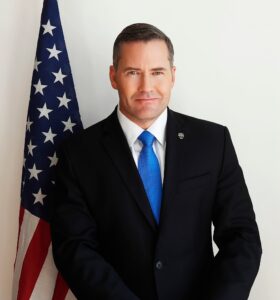by Irina Tsukerman
The latest Signal leaks have thrust the nation into a spiraling national security crisis, exposing vulnerabilities within intelligence operations and exacerbating political divisions in Washington. The breach, reportedly involving classified communications among government officials, has ignited a firestorm of legal battles, congressional infighting, and public mistrust in the ability of institutions to safeguard sensitive information. As both Republicans and Democrats seize on the scandal for political leverage, the crisis underscores deeper systemic weaknesses in cybersecurity, governance, and the enforcement of national security protocols.
National Security Implications

The exposure of sensitive communications via Signal presents an alarming breach in the U.S. national security infrastructure. Intelligence agencies rely on encrypted messaging platforms to ensure secure exchanges of classified information, and any compromise in these channels can have severe consequences, including the exposure of covert operations, the endangerment of field agents, and the disruption of diplomatic negotiations. The leaks not only reveal procedural failures but also embolden adversaries by providing them with insights into the U.S. decision-making process, strategic objectives, and potential vulnerabilities.
Beyond direct intelligence threats, the breach weakens allied confidence in U.S. security practices. Nations that share intelligence with the United States may reconsider the depth of their cooperation if they perceive that internal safeguards are insufficient. This erosion of trust can strain strategic alliances and make collective defense efforts, such as those under NATO, more challenging to execute. In a geopolitical climate where adversaries like China and Russia seek to exploit Western divisions, any internal disarray in national security mechanisms plays directly into their hands.
The revelation that texts sent by U.S. officials, including Representative Michael Waltz and former Director of National Intelligence John Ratcliffe, in a Signal chat could have jeopardized the U.S.’s ability to effectively gather intelligence on the Houthis speaks volumes about the intricacies of modern intelligence operations and the delicate nature of diplomatic and military efforts in volatile regions.[1] At the heart of this issue lies the vulnerability of U.S. intelligence assets in the Middle East, specifically in relation to the Houthis, and the broader implications for U.S. operations globally.
The timing of the leak is crucial. In recent years, the Houthis, a militia group backed by Iran, have played a key role in destabilizing Yemen and the surrounding region, while also threatening maritime security in the Arabian Sea. The U.S. has been deeply involved in efforts to monitor their actions, often through clandestine intelligence-gathering networks. These networks rely heavily on a combination of human intelligence (HUMINT), signals intelligence (SIGINT), and cyber tools to track Houthi movements, anticipate their next steps, and devise countermeasures that might support U.S. and allied interests in the region. The communication platform, Signal, was once heralded as a secure tool for transmitting such sensitive information, making it the go-to method for conveying intelligence in environments where operational secrecy is paramount.
However, the unfortunate irony in this case lies in the very tool that was presumed to offer security. As encrypted as Signal may be, the breach of trust that emerges from its misuse highlights a critical point: digital platforms, no matter how secure their encryption protocols, are only as effective as the operational integrity of their users. In this instance, the officials’ decision to communicate in a Signal chat, whether inadvertently or carelessly, exposes a much larger issue about operational discipline and awareness. The texts that were sent may have included key insights into U.S. intelligence priorities, ongoing operations, or assessments of the Houthis, all of which could provide adversaries with a distinct advantage in the intelligence battle.
In intelligence work, even seemingly innocuous information can be leveraged to devastating effect. When U.S. officials discuss intelligence matters—whether tactical or strategic—on any unsecured channel, they risk revealing not only sensitive details but also the methods and sources through which that intelligence was gathered. The implication is profound: adversaries who gain access to such communications might adjust their operational tactics to minimize their exposure to U.S. surveillance, thereby rendering critical intelligence efforts ineffective. This could be particularly harmful in the case of the Houthis, who are adept at exploiting gaps in U.S. intelligence and counterintelligence efforts.
What’s particularly troubling is that such leaks are not simply the result of an isolated incident; they reflect a broader failure in safeguarding intelligence, a failure that extends beyond the specific technological tool involved. These leaks underscore the vulnerability of high-ranking officials themselves, who, despite their experience, may not fully grasp the potential consequences of engaging in casual or unguarded discussions within digital environments. The careless nature of the communication implies a systemic issue in how intelligence is shared and handled, even within the U.S. government. In sensitive regions, especially those like Yemen, where multiple actors with competing interests operate, even minor lapses can tip the balance of intelligence operations and leave the U.S. at a disadvantage.
In addition to the tactical consequences, the leaks raise serious concerns about U.S. credibility and influence in the region. The Houthis, as well as their backers in Tehran, are keenly aware of the value of intelligence warfare. The information revealed in the Signal texts could not only help them to better understand U.S. operational approaches but also strengthen their ability to disrupt American and allied plans. Furthermore, the breach of trust may undermine the confidence of regional allies and partners who are working with the U.S. to counter the influence of Iran and maintain stability in the region. For them, the integrity of U.S. intelligence efforts is paramount. If those efforts are seen as compromised, even through inadvertent actions by high-ranking officials, it could undermine years of delicate diplomacy and cooperation.
The broader implications extend into the realm of cybersecurity and digital communication. While encryption technologies have advanced to make platforms like Signal more secure, the reality is that no digital tool is entirely immune from the risks posed by human error or cyber vulnerabilities. In this case, the leak serves as a reminder that, in an age where digital communications dominate intelligence-gathering, securing information is not just about choosing the right platform but about fostering a culture of strict operational security. This means maintaining a constant awareness of the risks associated with any digital communication, regardless of how seemingly secure it may be.
Moving forward, this incident should prompt a reevaluation of the protocols surrounding sensitive communications. It underscores the need for enhanced training, not only in using secure platforms but in understanding the far-reaching implications of seemingly small lapses in communication. A single text message, a careless remark, or an innocuous exchange of information can lead to significant consequences, and those in positions of power must recognize the gravity of their actions in the digital realm.
The Signal chat leaks involving Waltz and Ratcliffe do more than expose the immediate vulnerability of U.S. intelligence on the Houthis. They signal a systemic issue with the safeguarding of intelligence, the fragility of operational security in the digital age, and the broader consequences for U.S. interests abroad. The U.S. must now confront the fallout from these leaks, both in terms of its compromised intelligence efforts and the erosion of trust with its allies. It will need to reassess its approach to intelligence-sharing, improve digital security protocols, and, most critically, restore the discipline necessary to operate in an environment where even the smallest slip-up can have catastrophic consequences.
Cybersecurity Concerns

The Signal leaks expose fundamental cybersecurity concerns regarding government communications, the security of encrypted platforms, and the vulnerabilities of high-ranking officials to cyber threats. Key concerns include:
While Signal is widely regarded as a secure messaging app due to its end-to-end encryption, its use by national security officials raises concerns about whether third-party platforms should be trusted with highly sensitive government communications. Unlike proprietary government-secured networks, third-party apps remain susceptible to unknown vulnerabilities, zero-day exploits, and potential backdoor infiltration.
Even if Signal itself remains secure, the devices used by officials may not be. Personal or work-issued phones can be compromised through malware, phishing attacks, or insider threats, potentially exposing sensitive conversations stored on these devices. If adversaries gain access to a compromised device, encrypted communications may be decrypted or exploited.
While Signal encrypts message contents, metadata—including who communicated with whom, when, and for how long—remains vulnerable. Even without access to message content, adversaries can analyze patterns of communication to infer critical intelligence, such as coordination between officials, frequency of strategic discussions, and urgency of decision-making processes.
Signal’s disappearing messages feature can complicate efforts to conduct security audits and enforce accountability. The absence of retained records may hinder investigations into security breaches and could result in violations of federal record-keeping laws. Furthermore, adversaries may exploit this lack of retention to carry out disinformation campaigns, claiming fabricated messages existed when no records can be produced to refute them.
Encrypted communications rely on secure key exchanges. If an adversary successfully carries out a man-in-the-middle attack or compromises the encryption keys used in government Signal communications, entire conversations could be decrypted, rendering the platform ineffective for classified discussions.
The Signal leaks reveal a policy vacuum regarding encrypted messaging use among government officials. Without clear and enforceable cybersecurity policies governing what platforms can be used for official business, there is a heightened risk of security breaches. The government must establish strict guidelines on the approved methods for sensitive communications and ensure compliance through monitoring and audits.
Pattern of Faulty Cybersecurity Practices

The leaks also highlight a troubling pattern of faulty cybersecurity practices among senior officials, which ultimately led to the exposure of private data, emails, and passwords. Some of the key deficiencies include:
Many officials involved in the Signal group reportedly used passwords that were either reused across multiple accounts or lacked sufficient complexity, making them easier targets for brute-force attacks or credential stuffing techniques.[2]
Some officials failed to implement MFA (multifactor authentication) on their accounts, leaving them vulnerable to phishing and unauthorized access in the event of a password compromise. [3]
Several officials engaged in Signal discussions on personal devices rather than secured government-issued phones, increasing the risk of compromise through malware, spyware, or unauthorized access.
There is evidence that at least some of the leaks resulted from phishing attacks that tricked officials into revealing login credentials, allowing unauthorized actors to infiltrate their accounts.[4]
Some officials reportedly saved Signal messages or backup data in unsecured locations, potentially allowing adversaries to extract classified or sensitive information.
Once the breach was suspected, delays in implementing countermeasures and conducting forensic investigations allowed further unauthorized access and data exposure.
Information Adversarial Intelligence Agencies Could Glean

The leaked Signal chats could provide adversarial intelligence agencies with critical insights into U.S. operations, particularly in relation to the Houthis and broader national security vulnerabilities. Based on what has been released so far, the following intelligence could be inferred:
If U.S. national security officials discussed the Houthi threat in these chats, adversarial agencies could gain a better understanding of how the U.S. perceives the group’s capabilities, logistical challenges, leadership structure, and potential weaknesses. This intelligence could allow the Houthis and their backers, including Iran, to refine their operational security and countermeasures against U.S. actions. [5]
Any discussions of U.S. surveillance activities, planned strikes, or diplomatic strategies regarding the Houthis could compromise ongoing operations. Hostile actors could adjust their movements, communications, and counterintelligence measures accordingly.
The leaks could reveal internal U.S. debates over how to respond to Houthi attacks or their role in regional conflicts. Indeed, the Signal leak scandal underscored divisions among senior Trump officials concerning the US foreign policy priorities, such as the strategic response to Iran’s aggression and pursuit of nuclear weapons. Understanding how divided or unified the U.S. is on its strategy could inform adversaries on how to exploit hesitations or bureaucratic delays.[6]
If any discussions involved coordination with allies regarding the Houthis, adversaries could identify fractures in U.S. alliances, potential weak points in coalition efforts, and opportunities to undermine diplomatic initiatives. [7]
The breach itself signals weaknesses in U.S. cybersecurity measures, operational security, and inter-agency coordination. Foreign intelligence services will analyze how classified conversations were compromised and seek to exploit similar weaknesses in future cyber operations.
Understanding how U.S. national security officials utilize encrypted apps like Signal could help adversaries develop tactics to intercept, disrupt, or manipulate similar communications in the future. This may prompt adversarial intelligence agencies to enhance their cyber espionage efforts targeting encrypted platforms.
Legal Challenges and Investigations
From a legal standpoint, the Signal leaks raise pressing questions about the handling of classified information and the accountability of those responsible for safeguarding it. Federal laws, including the Espionage Act and various cybersecurity regulations, impose strict guidelines for the protection of national security data. If the leaks resulted from intentional misconduct, the Department of Justice could pursue charges against individuals involved, leading to prosecutions that may extend into the highest levels of government.
However, legal complexities emerge when considering whether government officials used unsecured personal devices or unauthorized applications to discuss classified matters. If these leaks stem from unauthorized access or insufficient cybersecurity measures rather than deliberate acts of espionage, the legal framework shifts toward systemic failures rather than individual criminal liability. This opens the door to sweeping legislative debates on the regulation of encrypted communications, the balance between privacy and security, and potential reforms in cybersecurity policy.
Likely Legal Violations in the Use of Signal by National Security Officials
The use of Signal by national security officials to discuss classified matters likely constitutes multiple legal violations, including:
Espionage Act Violations (18 U.S.C. § 793) – If classified information was willfully retained, transmitted, or disclosed on an unauthorized platform, those involved could face prosecution under the Espionage Act. Even if there was no intent to harm national security, the mere mishandling of classified information can be grounds for legal action.
Federal Records Act (44 U.S.C. Chapter 31) – The use of encrypted and potentially ephemeral messaging apps like Signal may violate record-keeping laws, which mandate the preservation of official government communications. If messages were auto-deleted or not archived in compliance with federal regulations, those involved could face administrative or legal consequences.
Presidential and Federal Records Act Amendments of 2014 – This law strengthens requirements for preserving electronic communications, explicitly covering senior officials’ use of unofficial messaging platforms. Failure to document and retain records from Signal chats could result in violations of transparency and accountability laws.
Computer Fraud and Abuse Act (18 U.S.C. § 1030) – If any official knowingly accessed or transmitted classified information in an unauthorized manner, they could face charges under the Computer Fraud and Abuse Act, which criminalizes unauthorized access to protected government systems.
Whistleblower Protection Act & Unauthorized Disclosure Statutes – If the leaks originated from an official attempting to expose misconduct, they could claim whistleblower protections. However, unauthorized disclosure of classified materials, even in the name of transparency, is still prosecutable under national security laws.
National Security Information Classification Rules (Executive Order 13526) – This executive order governs the classification of sensitive information. Officials who bypass established protocols for secure communications violate classification handling laws and could face administrative or criminal penalties.
The legal ramifications of these violations will depend on the scope of the breach, the intent behind the leaks, and whether officials knowingly circumvented security protocols. Investigators will likely focus on determining whether the use of Signal was a systemic issue or the result of rogue actions by specific individuals.
Political Fallout and Congressional Infighting

Saul Loeb/AFP via Getty Images
The leaks have amplified preexisting tensions between Republicans and Democrats, with each side leveraging the crisis to push their own narratives. Republicans, emphasizing the Biden administration’s perceived failures in national security, argue that the breach is symptomatic of a broader collapse in institutional oversight. They call for aggressive investigations, increased scrutiny of intelligence agencies, and potentially even purges of officials deemed responsible for mishandling classified information.
Democrats, on the other hand, frame the crisis as an extension of broader disinformation campaigns and internal sabotage efforts. Some argue that partisan actors within government agencies or politically motivated whistleblowers may have orchestrated the leaks to destabilize the administration. This viewpoint leads to demands for increased regulatory control over encrypted communications and stronger internal safeguards against rogue elements operating within national security structures.
As the scandal unfolds, congressional hearings are likely to become battlegrounds for competing ideological visions of government transparency versus secrecy, the role of technology in intelligence, and the future of encrypted messaging in national security operations. With upcoming elections looming, both parties will attempt to weaponize the crisis to galvanize their bases, further entrenching political divisions and making bipartisan solutions nearly impossible.
However, a bipartisan group of senators called for an investigation, signaling that there is a growing consensus regarding the importance of cybersecurity and a concern about the political and national security scandal from the leak. [8]
Attempted Cover-Up and Its Implications

The response of U.S. officials to the Signal leaks has raised further concerns about transparency and accountability. Reports indicate that rather than immediately addressing the breach, certain officials sought to downplay the extent of the compromise, delay disclosure, or obscure key details to minimize political fallout. This attempted cover-up has significant consequences:
Any perceived deception by government officials further diminishes public confidence in national security institutions. If officials are seen as prioritizing damage control over truth, skepticism towards government transparency efforts will deepen.
Efforts to cover up security breaches could result in additional legal repercussions, including obstruction of justice and violations of whistleblower protections. Investigations may focus not only on the breach itself but also on whether officials engaged in unlawful suppression of information.
The cover-up fuels bipartisan accusations of incompetence and misconduct, providing ammunition for political adversaries and intensifying calls for resignations, hearings, and policy overhauls.
If government officials mislead their own agencies or international partners about the severity of the breach, it could delay or weaken necessary countermeasures, allowing adversaries to exploit unaddressed vulnerabilities.
A lack of accountability sends a dangerous message to government personnel that security failures may be tolerated or hidden rather than addressed. This creates a culture of negligence and invites further breaches in the future.
What Congressional Hearings Have Revealed So Far
Recent congressional hearings have shed light on the gravity of the Signal leaks and the extent of the security breach. Key findings include:
Intelligence officials have denied that classified military operations were discussed in the Signal chats, though skepticism remains among lawmakers.
House Democrats have accused intelligence leaders of misleading Congress and called for the resignation of senior officials involved in the scandal.
Both Republican and Democratic senators have urged an independent investigation into the use of Signal and whether national security protocols were violated.
While some officials defended the platform’s use for secure communications, others, including former President Trump, questioned whether Signal itself was compromised.
The hearings have exposed sharp political divides, with one side pushing for full accountability while others downplay the issue, further complicating efforts to address the crisis.
Role and Likely Culpability of Each Official Involved
Senior Intelligence Officials – Those responsible for setting security protocols may face scrutiny for failing to enforce stricter communication policies. If they were aware of or encouraged the use of unsecured channels, they could face disciplinary actions or legal consequences.
National Security Advisors – Given their role in coordinating intelligence, any advisors involved in the leaks may be held accountable for lapses in judgment, potential mishandling of classified information, or failure to mitigate security risks.
Military Leadership – If high-ranking military officials participated in the Signal discussions, they could face legal scrutiny for violating communication protocols related to national defense operations.
State Department and Diplomatic Officials – Those involved in international negotiations may have exposed sensitive diplomatic strategies. Their actions could lead to internal disciplinary measures or strained relationships with allied nations.
White House Officials – If members of the administration participated in or attempted to cover up the leaks, they could face congressional inquiries, legal ramifications, or political fallout.
IT and Cybersecurity Personnel – If security teams failed to detect unauthorized use of Signal for classified discussions, they may be held accountable for gaps in monitoring and compliance.
Fallout Over JD Vance’s Comments on Europe and Egypt

JD Vance’s controversial remarks regarding Europe and Egypt have added another layer of political discord to the Signal leaks fallout. His comments, which many interpreted as dismissive of European security concerns while seemingly prioritizing Egypt’s role, have fueled speculation about fractures within the Republican foreign policy stance. The timing of these remarks—amid an ongoing national security crisis—has exacerbated concerns that GOP leadership is not presenting a unified approach to handling key international alliances.
From a diplomatic perspective, these comments risk alienating European allies at a time when transatlantic cooperation is critical for addressing both security and economic challenges. Reportedly, European leaders are furious. [9] The fallout may have impacted JD Vance’s trip to Greenland, leading to a significantly reduced profile and contributing to a cold reception. Meanwhile, Vance’s apparent focus on Egypt has raised questions about potential policy shifts that could alter existing U.S. commitments to regional stability. The controversy underscores broader divisions within the party over America’s role in global affairs and has deepened the already-contentious political fallout from the leaks.
Controversies Over Classified Information Leaks and Potential Conspiracy to Infiltrate the Chat
As scrutiny intensifies over the leaks, a growing debate has emerged about whether this breach was merely an incident of poor cybersecurity practices or part of a broader conspiracy to infiltrate U.S. national security discussions. Some officials have suggested that foreign intelligence operatives or domestic political actors may have deliberately gained access to the Signal group to extract sensitive information and create chaos within the administration.
The controversy surrounding how classified information surfaced raises key legal and security questions. If individuals within the administration deliberately leaked information for political gain, it could constitute a serious violation of federal law, including the Espionage Act. If external actors successfully infiltrated the chat, this would signal a catastrophic failure of internal security measures. Either scenario would require a full-scale investigation into how such a breach occurred and who was responsible for enforcement.
The Signal Leaks Lawsuit: Legal and Strategic Implications
The lawsuit concerning the Trump administration’s use of Signal for official communications marks a pivotal moment in the ongoing struggle between government transparency, national security, and the use of encrypted technologies. At its core, this legal battle highlights not only potential violations of record-keeping laws but also broader concerns about the accountability of high-ranking officials in an era where ephemeral messaging can erase history with a single tap.
The Lawsuit: A Challenge to Government Secrecy
The controversy erupted when it was revealed that senior administration officials had used Signal to communicate about sensitive government matters, including military operations, raising questions about government secrecy and privacy. Unlike traditional communication channels subject to archival regulations, Signal’s auto-delete feature enabled these officials to effectively erase conversations, raising alarms over potential violations of the Federal Records Act.
The watchdog group American Oversight filed a lawsuit to force the preservation and disclosure of these communications, arguing that the use of disappearing messages undermined public transparency and legal oversight. [10] The lawsuit centered on the concern that critical government records—potentially including discussions of national security, policy decisions, and crisis management—were being systematically destroyed, preventing future accountability.
The legal argument presented by the plaintiffs was straightforward: under federal law, government officials are required to preserve all records that document official actions, decisions, and policies. By utilizing an application designed to erase messages permanently, these officials circumvented established record-keeping laws. The case, therefore, became a test of how existing transparency mandates apply to modern digital communication tools that were never anticipated by legislators when the laws were drafted.
The Court Order: A Temporary but Significant Decision

In response to the lawsuit, U.S. District Judge James Boasberg issued a temporary restraining order requiring the preservation of all Signal communications exchanged by administration officials during a key period in March 2025. [11] This order was a direct response to the immediate risk that evidence could be lost as messages automatically disappeared.
The ruling had both immediate and long-term implications. On the surface, it simply forced officials to halt any further deletions and ensure that their communications remained available for legal review. However, at a deeper level, it sent a clear message: government officials could not use technological loopholes to escape accountability. This ruling effectively established a precedent that encrypted, disappearing messages do not place officials above federal record-keeping laws.
Moreover, the court’s decision underscored the tension between national security concerns and government transparency. The administration’s defense centered on the argument that Signal was used for operational security reasons, ensuring that sensitive information remained protected from foreign adversaries. While this rationale may have some merit in limited contexts, the judge’s order made it clear that secrecy must be balanced with the legal obligation to maintain historical records.
Broader Implications: The Future of Digital Accountability
The Signal leaks case is not just about one administration or a single lawsuit—it represents a broader challenge to governance in the digital age. As officials increasingly turn to encrypted messaging services for both personal and professional communications, the legal framework governing these interactions remains woefully outdated. This lawsuit exposes a glaring gap in the system: government accountability mechanisms are not designed for a world in which critical conversations can disappear without a trace.
The ruling raises pressing questions about the future of record-keeping laws. Should federal regulations be updated to explicitly prohibit the use of auto-delete messaging for government business? Should encrypted messaging platforms be required to offer retention options for official use? And, perhaps most critically, how should the government balance the competing interests of security and transparency in an era of cyber threats and espionage?
Additionally, the lawsuit shines a light on the broader cultural issue of impunity within government institutions. The use of Signal in this context was not an accident—it was a deliberate choice made by officials who understood the implications of their actions. This case illustrates a disturbing trend in which secrecy is weaponized as a tool to evade scrutiny, rather than as a means of protecting national interests.
The legal battle over the Signal leaks is more than a dispute over text messages—it is a fight over the very nature of government accountability. While the court’s ruling represents a temporary measure, the questions it raises will persist long after the specific case is resolved. At stake is not just compliance with existing laws, but the fundamental principle that public officials must be held to the same standards of transparency, regardless of the technologies they choose to use.
As encrypted communication becomes the norm, the government faces a choice: either adapt and create clear guidelines for digital transparency, or allow the erosion of public accountability to continue unchecked. The outcome of this case will not only determine how Signal is used within the government but will also set the tone for the broader battle between secrecy and oversight in the modern era.
Signal Leaks and the TikTok Debate: A Collision of Legal and Security Concerns

The Signal leaks scandal has reignited longstanding concerns about government transparency, data security, and the appropriate limits of encrypted communications. At the same time, a parallel debate is unfolding over the national security risks posed by TikTok, the Chinese-owned social media platform accused of facilitating foreign influence and unauthorized data collection. While these two issues may seem unrelated at first glance, they are inextricably linked by a deeper conflict over how the U.S. government handles digital communication, national security, and privacy.
The Double Standard in Digital Accountability
The Signal controversy highlights an uncomfortable contradiction in the U.S. government’s approach to digital security. On one hand, officials are justifying their use of Signal as a necessary tool to protect sensitive communications from foreign adversaries. On the other, the government is aggressively pursuing restrictions on TikTok, citing its potential use as a surveillance tool by the Chinese Communist Party (CCP). The core argument against TikTok is that its data collection practices could allow China to monitor American citizens, access sensitive information, and influence public discourse.
However, the Signal leaks expose a different kind of threat—the use of encrypted, disappearing messages by government officials to evade accountability. While TikTok is being targeted for its potential misuse of data, there is comparatively little discussion about the misuse of encrypted technologies within the government itself. This raises a critical question: Is the U.S. government applying a double standard when it comes to digital security? If TikTok is a national security risk because of its potential for secrecy and surveillance, then should the same scrutiny not be applied to U.S. officials using encrypted messaging to conduct government business without oversight?
Transparency vs. Security: A Battle Over Control
At the heart of both the Signal leaks and the TikTok controversy is the question of control—who has access to critical digital information, and how that access should be regulated. The U.S. government’s concern over TikTok is not just about data collection; it is about the inability to control where that data goes. Similarly, the Signal case is not merely about whether officials used disappearing messages—it is about whether the government can enforce accountability when officials use technology to bypass traditional oversight mechanisms.
In both cases, security and transparency are at odds. The push to ban or restrict TikTok is driven by the belief that Chinese state influence over the app poses an existential risk to national security. Yet, the government’s own use of encrypted apps like Signal without proper oversight represents a different, but equally concerning, risk—one where the lack of transparency erodes public trust in government institutions. Both cases reflect a larger struggle over whether digital security should come at the cost of public oversight, and whether the government itself should be held to the same standards it seeks to impose on foreign technology companies.
Legal Precedents and the Future of Digital Regulation
The legal battles surrounding Signal and TikTok also have significant implications for future technology regulation. The lawsuit against government officials for their use of Signal could set a precedent for stricter record-keeping requirements for all official digital communications. If the courts rule that messages sent via disappearing apps must be preserved, it could lead to broader reforms requiring government agencies to establish clearer policies on digital record retention.
Meanwhile, the TikTok debate is shaping discussions around whether foreign-owned apps can be legally restricted or banned. Recent Congressional move to force TikTok’s sale or ban it outright has led to legal challenges over free speech, corporate rights, and government overreach. [12] As Congress moves forward with efforts to limit TikTok’s operations in the U.S., it may have to establish new regulatory frameworks for how foreign tech companies operate—rules that could eventually extend to other platforms, including encrypted messaging services. All the while the Trump administration is looking for a way to preserve Tik-Toks operations in the US, including by potentially facilitating a sale to a group of ByteDance investors with US links. The sale would create a new company, bought by US investors, to manage the Tik-Tok platform operations, while ByteDance would retain connections, potentially violating the law. [13]
Furthermore, the two cases highlight the evolving legal landscape surrounding digital privacy. While officials argue that Signal is necessary for protecting sensitive government communications, many of the same policymakers support restricting TikTok on the basis of data privacy concerns. This contradiction underscores the lack of a coherent U.S. policy on digital privacy—one that applies equally to government officials and private companies.
A Defining Moment for Digital Policy
The Signal leaks scandal and the TikTok debate both illustrate the growing tensions between security, privacy, and government accountability in the digital age. While the U.S. government seeks to crack down on TikTok for its potential security risks, it faces a credibility crisis over its own handling of encrypted communications. The lack of clear, enforceable policies on both issues has created a landscape where security concerns are selectively applied, often influenced more by political considerations than by a consistent legal framework.
Ultimately, these two cases will shape the future of digital governance in the U.S. If the government moves forward with tighter regulations on TikTok, it may also need to address the loopholes that allow government officials to circumvent transparency laws through encrypted messaging. Likewise, if courts impose stricter rules on government record-keeping, it may set a precedent for broader regulations on how digital platforms—foreign and domestic—handle data security and privacy.
In the battle over digital communications, the fight is not just over TikTok or Signal—it is over who gets to control the flow of information in the modern age, and under what rules. How these cases unfold will determine whether the U.S. can develop a coherent digital security policy that applies to both government and private sector technology, or whether selective enforcement and political convenience will continue to dictate the future of digital accountability.
Information Warfare and the Signal Leaks: A Digital Battlefield in the Age of Accountability
The Signal leaks controversy has cast a long shadow over the intersection of national security, digital communication, and public transparency. As the U.S. government grapples with the ramifications of officials using encrypted apps for sensitive communications, a broader discussion on information warfare emerges. At its core, this scandal is more than just a case of leaked messages or legal compliance—it signals a new era in which information warfare and the manipulation of digital spaces are as integral to national security as traditional military operations. The debate over Signal encapsulates the ongoing struggle to control the flow of information in a hyper-connected, technology-driven world.
The Battle for Control Over Information Flow
At the heart of information warfare is the idea of controlling or disrupting the flow of information. The Signal leaks provide a striking example of how encrypted platforms, designed to protect sensitive communications, can be weaponized to serve the interests of those who seek to control both the content and the availability of information. In the case of government officials using Signal for official business, the disappearing messages feature raises significant concerns about the accessibility of government records, particularly those that might have national security implications. The very technology designed to protect privacy could easily be misused as a tool to avoid accountability, giving rise to the question of whether certain government entities are intentionally obscuring their actions from both the public and oversight bodies.
This dynamic plays into the broader scope of information warfare, where the control of information becomes not just a matter of transparency but a strategic advantage in geopolitics. By leveraging encrypted communication systems like Signal, actors can sidestep traditional checks and balances, undermining democratic processes and the integrity of governmental oversight. In this sense, the Signal leaks controversy exposes how digital technologies can be utilized not only for defensive purposes but for strategic obfuscation, potentially allowing state actors to manipulate or hide their operations.
The Role of Encryption in Modern Information Warfare
Encryption itself has become a central battleground in information warfare. On the one hand, encryption technologies like Signal are hailed as vital tools for protecting personal and state communications in an era of cyber espionage and surveillance. Yet, on the other hand, these same technologies can be used to thwart efforts by governments, journalists, and watchdog organizations to hold power to account. In the context of Signal, while its intention is to safeguard information from malicious actors, the app’s disappearing messages feature also complicates the ability of external parties—whether governmental or private sector actors—to access critical information.
The tension between privacy and accountability is not just a philosophical dilemma; it has tangible consequences in terms of national security. State actors, be they foreign adversaries or domestic agencies, increasingly rely on encrypted communication tools to conduct covert operations, influence public opinion, and maneuver strategically within the information domain. In this sense, the battle over Signal and its potential misuse is emblematic of the larger question of who controls digital communication technologies and who benefits from that control.
In the case of government officials using encryption tools to communicate about military operations, policy decisions, and other sensitive matters, the potential for information warfare is heightened. If key messages are erased without a trace, it becomes nearly impossible to ascertain what was said, who was involved, and what decisions were made. This presents an existential risk to accountability and transparency, as the ability to audit and investigate governmental actions becomes compromised. From a strategic standpoint, the use of disappearing messages in official settings allows for plausible deniability, the ultimate tool in the information warfare arsenal.
Strategic Implications for Political and Public Narratives
The Signal leaks issue also touches upon a more subtle but equally dangerous aspect of information warfare: narrative control. In modern conflicts—whether political, military, or ideological—who controls the narrative is just as important as who controls the territory. The act of communicating in secret, whether through encrypted messaging platforms or private communications, allows state actors to shape the public narrative in ways that remain hidden from scrutiny. In the case of the Signal leaks, the messages exchanged behind closed doors could offer invaluable insights into the decision-making process, the allocation of resources, and the strategic priorities of those in power. If these messages are erased or kept out of reach, it erodes public trust and creates a vacuum of uncertainty that can be exploited by other actors.
In the realm of information warfare, controlling the flow of messages and narratives can shape public perception, create misinformation, and even manipulate political outcomes. The U.S. government’s use of Signal in this case—while ostensibly designed for security—also has the potential to craft an alternative reality, one in which certain decisions and actions remain cloaked in secrecy. When officials are able to control what is recorded, retained, and available for public consumption, they have the power to shape history itself, selectively crafting a narrative that suits their needs while avoiding accountability.
The implications are far-reaching. If the government can erase its digital footprint with ease, the public’s ability to track governmental behavior, especially in matters of foreign policy or military operations, is severely compromised. This creates a fertile ground for adversaries to introduce competing narratives—whether true or false—that can destabilize the political environment, confuse the electorate, and undermine the credibility of the state. From a national security perspective, this becomes an insidious form of information warfare, where the very tools meant to protect the state from foreign influence can be turned inward to manipulate and control public opinion.
Implications for Governance and the Future of Information Warfare
As we move further into an era where digital technologies shape nearly every aspect of governance and society, the Signal leaks controversy serves as a crucial case study in the emerging field of information warfare. What happens when government entities exploit encryption and privacy technologies to manipulate records, hide sensitive information, and control political narratives? How do we, as a society, balance the need for security with the imperative of transparency? And, ultimately, what are the broader consequences for democratic processes when the very mechanisms of information—trusted systems of communication, record-keeping, and oversight—are weaponized for political gain?
The battle over Signal is not just about the misuse of a particular platform; it is a microcosm of the broader struggle for control over information. As the digital realm becomes increasingly militarized, information warfare will no longer be a secondary concern but a central feature of national security strategy. In this new landscape, the ability to access, control, and manipulate information will define the winners and losers, both on the global stage and in the domestic political arena.
The Signal leaks controversy raises urgent questions about how modern societies can safeguard transparency and accountability in an age when digital tools can be used to obscure, deceive, and control. As we move forward, it is critical that legal frameworks, national security policies, and technological innovations evolve to ensure that the power of information remains in the hands of those who are accountable to the people they serve. The future of information warfare will depend on our ability to balance the power of encryption with the necessity of truth in the digital age.
The Israel-Houthi Intelligence Leak: Impact on US-Israel Intelligence Sharing and Strategic Relations

The recent controversy surrounding the leaked Signal messages, detailing the Israeli intelligence support for the Houthi strike targets, introduces a complex intersection of geopolitics, national security, and intelligence-sharing dynamics. At its core, this incident not only undermines trust in intelligence operations but also highlights the delicate nature of strategic partnerships—particularly in the context of the U.S.-Israel intelligence relationship. Israel’s role in providing intelligence, particularly when it involves sensitive regional operations, raises critical questions about the transparency and security of intelligence exchanges. The leak’s fallout may reverberate across U.S.-Israel relations, and have broader implications for the international intelligence-sharing landscape.[14]
Israel’s Role in Providing Intelligence: A Delicate Balance
Israel has long positioned itself as a key player in Middle Eastern intelligence, often providing crucial information to allies, including the United States. Its intelligence agencies, notably Mossad, have developed a reputation for their ability to navigate complex geopolitical environments and uncover critical information that can shape military and strategic decision-making. In this context, the Israeli intelligence community’s decision to support targeting the Houthis, a faction entrenched in the ongoing Yemen conflict, was not taken lightly. Israel’s involvement was driven by several factors, primarily its strategic objectives in the region, including curbing Iranian influence, maintaining security in the Red Sea corridor, and weakening Iranian-backed proxy groups like the Houthis.
Providing intelligence on strike targets, however, places Israel in a precarious position. Not only does it expose Israel to direct retaliation from Houthi forces or Iranian-backed elements, but it also raises concerns regarding the exposure of sensitive intelligence-sharing processes. The leak of these details risks disrupting the fine balance of secrecy and strategic alliance management that has long characterized the U.S.-Israel relationship. As a result, the Israeli intelligence community is likely to be deeply concerned about the implications of this leak, both for the safety of its operations and for the potential fallout in its intelligence-sharing agreements.
Concerns of the Israeli Intelligence Community
For Israeli intelligence officials, the consequences of the leak are multifaceted. The immediate concern revolves around the safety and effectiveness of ongoing operations. Intelligence sources in the region could be compromised if adversarial actors gain access to sensitive targeting data. Moreover, any operation that requires secrecy and precision may be significantly undermined if its details are broadcasted, as this could result in shifting tactics or preemptive counteractions by adversaries, notably Iranian-backed forces.
Equally troubling for Israel is the risk to its credibility in intelligence-sharing partnerships, particularly with the United States. The Israeli government has long trusted the confidentiality of its communications with U.S. intelligence services, which rely on the secure exchange of information to coordinate military and strategic objectives in the Middle East. A breach of this trust could diminish the U.S.’s willingness to accept intelligence from Israeli sources in the future, fearing that sensitive information might be exposed to unauthorized third parties.
The Israeli intelligence community is also deeply concerned about the broader implications this scandal could have on its regional operations. As Israel maintains a robust network of covert relationships with other regional players, any public revelation of intelligence-sharing details could destabilize these delicate partnerships, especially if adversarial states, such as Iran or Syria, view Israel’s actions as part of a larger covert campaign. In this regard, Israel is walking a fine line between operational security and diplomatic relations, and the Signal leak only exacerbates the challenges it faces.
Impact on U.S.-Israel Intelligence Sharing Relations
The relationship between the U.S. and Israel has long been built on a foundation of mutual trust in intelligence sharing. Israel, in particular, has been a trusted source of intelligence, providing the U.S. with critical data on terrorist activities, nuclear threats, and regional instability. However, the Signal leak exposes a significant vulnerability in this system—namely, the protection of sensitive intelligence, and the broader question of how much control Israel and the U.S. have over their respective intelligence networks.
The handling of this situation is likely to have lasting effects on the U.S.-Israel intelligence-sharing relationship. On one level, the U.S. will be keen to understand the breach and identify how the intelligence was exposed. If the leak occurred due to systemic failures in protecting sensitive communications, the U.S. could face a challenge in reassuring its own intelligence community that such breaches will be adequately addressed. The U.S. will likely push Israel to strengthen safeguards on intelligence-sharing protocols, increasing the need for robust encryption and tighter controls over sensitive data exchanges.
Moreover, the U.S. government may have concerns about the credibility and reliability of Israeli intelligence in future cooperation. While Israel has a stellar record of providing high-value intelligence, the leak could force American intelligence agencies to reassess the risks associated with relying on Israeli sources for future operations, especially those involving covert military action. This could result in more cautious engagement with Israel in high-stakes intelligence sharing, perhaps leading to a reevaluation of the types of intelligence deemed suitable for joint operations.
Simultaneously, the Israeli government may seek to reassure the U.S. by demonstrating its commitment to strengthening operational security and making necessary reforms to prevent future leaks. Israel’s desire to maintain its status as a key intelligence partner of the U.S. will likely prompt a rapid response aimed at restoring confidence, possibly through increased transparency on internal security measures or more rigorous vetting processes for those involved in sensitive operations.
The Broader Implications for Intelligence Alliances

The fallout from this controversy has broader implications for the global intelligence-sharing community. The U.S. and Israel are not the only partners involved in sensitive intelligence exchanges; a wide network of countries relies on similar frameworks of mutual trust. If this leak erodes confidence in U.S.-Israeli intelligence cooperation, it could have ripple effects on other intelligence alliances, particularly those that involve clandestine operations, such as the Five Eyes intelligence network. [15]
In an age where cyber threats, information leaks, and foreign espionage are prevalent, the vulnerability of intelligence operations has never been more apparent. This incident may force nations to rethink how they manage the security of their sensitive digital communications, especially within the context of encrypted platforms. If the U.S. and Israel cannot safeguard their most sensitive information, other intelligence-sharing partners may demand more stringent protections before engaging in future cooperation. This could lead to a realignment of global intelligence strategies, where nations may become more hesitant to share intelligence unless they are certain their security measures are impenetrable.[16]
Moreover, adversarial powers, particularly Russia and China, will closely monitor the fallout from the Signal leak, using it as an opportunity to exploit any weaknesses in the U.S.-Israel intelligence-sharing system. The leak may inspire rival states to intensify their information warfare operations, seeking to exploit the vulnerabilities exposed by the breach for their own geopolitical advantage.
A Defining Moment for Intelligence Security
The Signal leak, which implicates Israeli intelligence and exposes sensitive operational details about Houthi strike targets, presents a critical moment for the U.S.-Israel intelligence-sharing relationship. The controversy raises pressing questions about the security of digital communication tools, the risks associated with intelligence leaks, and the potential for strategic instability caused by the erosion of trust between allies.
How Israel and the U.S. handle the fallout from this breach will shape their future intelligence cooperation, as well as set the tone for global intelligence-sharing practices moving forward.
The delicate balance between transparency, operational secrecy, and national security demands a more nuanced approach to intelligence sharing. In an age where information is power, securing intelligence relationships while maintaining the trust of global partners will be increasingly difficult. The lessons learned from this incident could have lasting implications for how nations protect their most valuable intelligence assets and the alliances that rely on them.
The Road Ahead
The Signal leaks expose not only immediate national security risks but also the long-term vulnerabilities in America’s intelligence and governance frameworks. If systemic reforms are not implemented, the crisis may serve as a precedent for further breaches, emboldening adversaries and eroding public trust in the government’s ability to manage sensitive information.
To mitigate future risks, policymakers must prioritize a comprehensive reassessment of cybersecurity infrastructure, enhanced legal frameworks governing the use of encrypted communication platforms, and a recalibration of inter-agency cooperation to prevent partisan exploitation of security failures. Without decisive action, the United States risks slipping into an era of perpetual intelligence insecurity, where politically motivated leaks and foreign exploitation become the new normal in the landscape of national security.
What Should Happen vs. What Is Likely to Happen
What Should Happen
The government must enforce stricter cybersecurity policies, including bans on the use of unauthorized third-party apps for classified discussions and mandatory encryption protocols for all official communications.
Officials who knowingly violated security protocols should face disciplinary action, whether through administrative measures, demotions, or legal consequences.
All officials with access to classified information should undergo mandatory cybersecurity training to prevent future lapses in operational security.
Congress should introduce bipartisan legislation to address cybersecurity vulnerabilities, establish clearer guidelines for communication security, and impose penalties for noncompliance.
A proprietary, government-controlled encrypted messaging system should be developed and deployed to prevent reliance on third-party applications.
What Is Likely to Happen
Instead of immediate cybersecurity reforms, the issue will likely become a partisan battleground, with both parties using the scandal to attack each other rather than implementing effective policy changes.
While some lower-ranking officials may face consequences, high-profile figures are likely to evade full responsibility due to political and institutional protections.
Rather than enacting comprehensive cybersecurity reforms, government agencies may implement minimal changes to appease public concern without addressing the core issues.
The lack of immediate and effective reforms will further erode public confidence in the government’s ability to protect sensitive information, leading to increased skepticism about national security measures.
The Signal leaks expose deep systemic issues that require urgent reform, but political inertia and bureaucratic resistance may prevent meaningful change, leaving the U.S. vulnerable to further breaches in the future.
Shifting Blame: A Misstep in the Signal Leaks Scandal and Its Reputational Fallout
In the wake of the Signal leaks controversy, a critical misstep emerged when certain U.S. officials attempted to shift blame for the incident onto external actors—specifically, the Biden administration and journalist Jeffrey Goldberg. [17] While this maneuver may have been seen as a tactical move to deflect attention from the real vulnerabilities exposed by the leak, it ultimately harmed the credibility and reputation of those involved. In the arena of political accountability and national security, such moves are not only misguided but ultimately self-sabotaging. Blaming others for what is, at its core, a systemic failure to protect sensitive intelligence sends a dangerous message about the integrity of leadership and the resilience of key institutions in times of crisis.
The Pitfall of Deflecting Responsibility
One of the foundational principles of effective leadership—particularly in matters of national security—is the ability to accept responsibility when errors are made. Shifting blame to the Biden administration or journalist Jeffrey Goldberg represents a failure to adhere to this principle. By attempting to place the fault with external parties, those U.S. officials who engaged in this blame-shifting failed to confront the root cause of the problem: the lack of robust security measures and systemic vulnerabilities that allowed the Signal leaks to occur in the first place. This deflection undermines the very trust that is required in national security operations and public governance.
In essence, the attempt to place blame externally sends a clear message to both the public and internal stakeholders that those in power are unwilling to confront their own failures. This not only weakens the authority of those making such claims but also creates a narrative of incompetence. The American people and international allies expect their leaders to own up to lapses in judgment, rather than obfuscating the issue with misplaced accusations. When officials fail to do so, they risk losing public confidence in their ability to handle sensitive and complex matters effectively.
Additionally, by blaming a high-profile figure such as Goldberg, a respected journalist, those within the U.S. government inadvertently elevate the controversy, creating a media storm that amplifies the leak’s significance rather than diminishing it. This move plays into the hands of those who wish to politicize the issue, diverting attention away from the real concerns surrounding the leak—issues of national security, intelligence integrity, and accountability—and focusing instead on petty political squabbles. In a scenario where national security is at stake, this is not only counterproductive but also damaging to the reputation of the officials involved.
The Strategic Error of Undermining Trust
Shifting blame in this manner also exposes a critical vulnerability in the U.S. intelligence community’s operations: a lack of internal cohesion and an unwillingness to take responsibility for failures in protecting sensitive information. The handling of the Signal leaks raises important questions about how U.S. intelligence agencies handle classified communications, and how they ensure the security of their officials’ actions. Instead of focusing on improving these internal processes, pointing fingers at an external administration or a journalist diverts attention away from the underlying issues that enabled the leaks.
This deflection also damages relationships with key international allies. The global intelligence-sharing network relies on trust, cooperation, and an understanding that sensitive information will be handled securely. By failing to confront the reality of their own institutional shortcomings, the U.S. undermines the integrity of this network and risks eroding the confidence of its allies. A reputation for passing the buck on matters of national security could result in reluctant partners, who might now hesitate before sharing critical intelligence with the U.S. for fear that their own vulnerabilities could be exposed.
Moreover, the attempt to shift blame onto the Biden administration compounds the political polarization that is already rife in the U.S. It turns the incident into a partisan issue, focusing on finger-pointing rather than constructive problem-solving. National security should transcend party lines, but by making the issue a political battle, U.S. officials risk deepening divisions and distracting from the urgent need for a cohesive, effective response to the breach. This undermines the very unity needed to address the broader challenges posed by the leak.
Deterioration of Public and Institutional Trust
When those in power engage in the blame game, they damage their own credibility and the trust placed in them by the public. The American public expects its leaders to act with transparency and integrity, particularly when national security is at stake. By attempting to pass the blame, those responsible for the leak effectively signal to the public that they are more concerned with protecting their own positions than with safeguarding the interests of the nation. This erodes the trust that is essential to maintaining stability within government institutions.
This incident also calls into question the competence of those at the helm of U.S. intelligence agencies and their ability to safeguard critical information. The manner in which they handled the crisis—by deflecting blame instead of addressing the root cause—only amplifies concerns over their preparedness and ability to lead during times of heightened security risks. By failing to act decisively, officials risk turning a singular leak into a broader scandal of incompetence and mismanagement.
Furthermore, this blame-shifting perpetuates a culture of impunity within government institutions, where officials may feel that they can evade accountability for their actions. When leaders fail to take responsibility for their mistakes, it sends a message that there are no real consequences for failures. This culture not only undermines public confidence but also creates a dangerous precedent for future decision-making, where individuals may be incentivized to prioritize self-preservation over national security.
The Path Forward: Restoring Integrity and Accountability
In the wake of the Signal leaks scandal, the U.S. government must focus on regaining its credibility by addressing the root causes of the breach rather than shifting blame to external parties. This requires a transparent investigation into how the leak occurred, the identification of systemic vulnerabilities, and the implementation of stricter protocols to prevent future incidents. It also means holding accountable those responsible for failing to protect sensitive information, regardless of their political or professional standing.
Furthermore, the U.S. government must prioritize restoring the trust of its international intelligence partners. This can only be achieved by demonstrating a commitment to safeguarding the integrity of intelligence-sharing relationships and taking meaningful steps to ensure that such breaches do not occur again. Fostering an environment of accountability and transparency is critical to ensuring that national security remains the foremost priority in both domestic and international spheres.
The attempt to shift blame in the wake of the Signal leaks was a strategic misstep that ultimately damaged the reputation of the U.S. officials involved. By avoiding responsibility and deflecting attention to external actors, they undermined their own credibility and weakened the trust placed in them by both the public and international allies. In order to restore confidence and prevent future breaches, the U.S. must confront the issues head-on, ensuring that accountability and transparency guide their response to this crisis.
Pam Bondi’s Refusal to Open an Investigation

Pam Bondi’s refusal to open an investigation into the Signal leaks reflects a complex interplay of political considerations, legal maneuvering, and institutional protectionism. [18] As a close Trump ally, Bondi is likely concerned about the political fallout an investigation would generate, particularly if it implicates high-level officials within the administration. Additionally, she may view an inquiry as unnecessary or damaging to national security, preferring to handle the matter internally rather than exposing vulnerabilities to public scrutiny.
Bondi’s decision also aligns with broader GOP strategies of minimizing internal discord and shielding key figures from legal consequences. Investigations into national security breaches often lead to extensive media coverage, public hearings, and calls for accountability—outcomes that the administration may wish to avoid. By refusing to launch an inquiry, Bondi effectively reduces the immediate pressure on Trump and his national security team.
Why Trump Is Not Firing Anyone

Trump’s reluctance to fire any officials over the Signal leaks underscores his preference for loyalty over accountability. [19] Removing key figures from their positions could signal weakness, invite further scrutiny, and risk alienating crucial allies within his administration. Instead, Trump appears to be downplaying the severity of the incident, dismissing it as overblown or politically motivated rather than a genuine national security crisis.
Additionally, firing officials could backfire by prompting whistleblowers or disgruntled former staffers to come forward with damaging information. By maintaining the status quo, Trump ensures that those involved remain within his sphere of influence, where they are less likely to turn against him.
From a strategic standpoint, Trump may also view the leaks as a manageable crisis rather than an existential threat. If the political cost of taking decisive action outweighs the benefits, he is likely to rely on deflection, media narratives, and congressional allies to contain the fallout rather than engaging in a sweeping purge of officials. [20]
The Signal leaks expose deep systemic issues that require urgent reform, but political inertia and bureaucratic resistance may prevent meaningful change, leaving the U.S. vulnerable to further breaches in the future.
References
[1] CNN. “Waltz, Ratcliffe Concerns Over Houthi Intelligence.” CNN, March 28, 2025. https://www.cnn.com/2025/03/28/politics/waltz-ratcliffe-concerns-houthi-intelligence/index.html.
[2] Waltz, Mike. “Rep. Mike Waltz Criticizes Signal, Venmo Use Amid Yemen Controversy.” CBS News, March 28, 2025. https://www.cbsnews.com/news/mike-waltz-venmo-signal-chat-yemen/
[3] Forbes Breaking News. “One Of The Greatest National Security Failures’: Frost Blasts Trump Admin Over Leaked War Plans.” YouTube, uploaded by Forbes Breaking News, March 25, 2025. https://www.youtube.com/watch?v=Ey7ZmCnBhjM.
[4] Times of India. “Personal Information of Trump’s Security Officials Found Online: Report.” The Times of India, March 28, 2025. https://timesofindia.indiatimes.com/world/us/personal-information-of-trumps-security-officials-found-online-report/articleshow/119566574.cms.
[5] Ross, Tim, Esther Webber, Jacopo Barigazzi, and Nicholas Vinocur. “Europe Fumes at Trump Team’s Insults in Leaked Signal Chat.” Politico, March 25, 2025. https://www.politico.eu/article/europe-fume-donald-trump-team-insult-leak-signal-chat/.
[6] Zeeshan Aleem, “Signal Chat Leak, Yemen Bomb Attack, and Vance’s Response.” MSNBC, March 28, 2025. https://www.msnbc.com/opinion/msnbc-opinion/signal-chat-leak-yemen-bomb-attack-vance-rcna198384.
[7] Bruce Schneier. “How the Signal Chat Leak Makes the NSA’s Job Harder.” Foreign Policy, March 28, 2025. https://foreignpolicy.com/2025/03/28/signal-chat-leak-trump-technology-security-houthis-group-defense-nsa/
[8] Amira El-Fekki, “Iran, Donald Trump, and the Signal Group Chat War Plans.” Newsweek, March 28, 2025. https://www.newsweek.com/iran-donald-trump-signal-group-chat-war-plans-2051933
[9] “Bipartisan Group of Senators Call for an Investigation into Signal Group Chat.” MSNBC, March 28, 2025. https://www.msnbc.com/way-too-early/watch/bipartisan-group-of-senators-call-for-an-investigation-into-signal-group-chat-235656261710.
[10] Tillman, Zoe. “Trump Cabinet Officials in Leaked Signal Chat Face Lawsuit.” Bloomberg, March 26, 2025. https://www.bloomberg.com/news/articles/2025-03-26/trump-cabinet-officials-in-group-chat-flap-face-a-lawsuit.
[11] Sneed, Tierney. “Judge Boasberg Weighs in on Signal Records Case.” CNN, March 27, 2025. https://www.cnn.com/2025/03/27/politics/signal-records-judge-boasberg/index.html
[12] Lutkevich, Ben. “TikTok Bans Explained: Everything You Need to Know.” TechTarget, February 18, 2025. https://www.techtarget.com/whatis/feature/TikTok-bans-explained-Everything-you-need-to-know.
[13] Baker-White, Emily. “TikTok, Trump, and the April Deadline.” Forbes, March 28, 2025. https://www.forbes.com/sites/emilybaker-white/2025/03/28/tiktok-trump-april-deadline/.
[14] Youssef, Nancy A., Alexander Ward, and Michael R. Gordon. “Israel Supplied Intelligence in Airstrike Discussed in Signal Chat, Officials Say.” The Wall Street Journal, March 28, 2025.
https://www.wsj.com/politics/national-security/israel-supplied-intelligence-in-airstrike-discussed-in-signal-chat-officials-say-9a9e0abf.
[15] Cecco, Leyland. “Canada’s Ex-Spy Chief Says White House Response to Signal Leak Threatens ‘Five Eyes’ Security.” The Guardian, March 26, 2025. https://www.theguardian.com/world/2025/mar/26/canada-five-eyes-security-signal-leak-white-house-response.
[16] Ball, James. “Can Five Eyes Survive the Signal Scandal?” Prospect, March 27, 2025. https://www.prospectmagazine.co.uk/world/united-states/69602/can-five-eyes-survive-the-signal-scandal.
[17] Mansfield, Erin. “Signal, Atlantic and Trump Stories.” USA Today, March 28, 2025. https://www.usatoday.com/story/news/politics/2025/03/28/signal-atlantic-trump-stories/82676942007/.
[18] Herzlich, Taylor. “Pam Bondi Slams CNN Analyst’s Call to Probe Signal Leak: ‘There’s a Reason Why Their Ratings Are Plummeting.'” New York Post, March 28, 2025. https://nypost.com/2025/03/28/media/pam-bondi-slams-cnn-analysts-call-to-probe-signal-leak-theres-a-reason-why-their-ratings-are-plummeting/.
[19] Jacobs, Jennifer, Gabrielle Ake, and Kathryn Watson. “Trump Has Not Asked Waltz to Resign, but the Signal Chat Issue Is ‘Still a Hot Potato,’ One Official Says.” CBS News, March 28, 2025. https://www.cbsnews.com/news/trump-has-not-asked-waltz-to-resign-but-signal-issue-continues/.
[20] Castro, Amanda, and Hannah Parry. “Donald Trump Signal Group Chat War Plans: Administration Live Updates.” Newsweek, March 28, 2025. https://www.newsweek.com/donald-trump-signal-group-chat-war-plans-administration-live-updates-2050665.


No responses yet